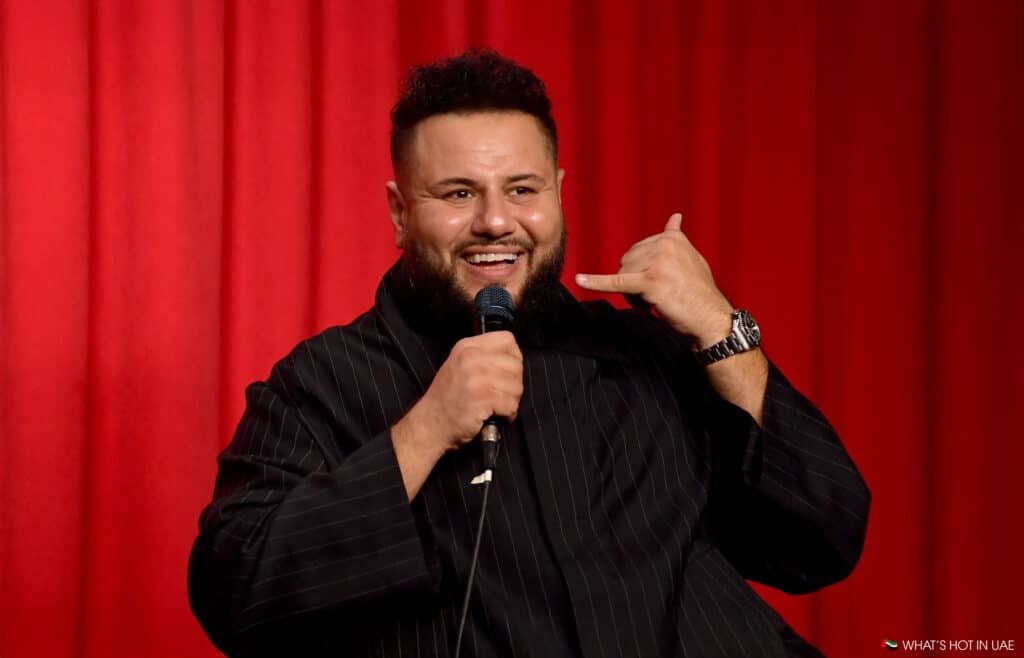Mo Amer can still remember his first paid gig. Seventeen years old, playing for just $25 in a small, smoky Houston bar. On a three-foot triangular stage, he faced a room fogged with cigarette smoke and vague interest. That night, like so many nights for a fledgling comedian, ended in chaos, but it was a start [1]. For decades, the stories of Palestinians and Arabs in mainstream American media have been largely absent, one-dimensional, or told by others. This created a void of authentic, nuanced narratives, leaving audiences with stereotypes instead of human beings. This article is not just another biography of a successful comedian. It is an in-depth analysis of how Mo Amer, the Palestinian American comedian and creator, masterfully transformed the personal trauma of displacement and a decades-long struggle for citizenship into groundbreaking comedy that is influencing culture and reshaping Hollywood. We will explore his journey from a refugee in Texas to the creator of a critically acclaimed Netflix series, examining how his work serves as a powerful vehicle for identity, representation, and healing.
The Long Road from Kuwait to Houston: A Refugee’s Story
To understand the depth and purpose behind Mo Amer’s comedy, one must first understand the story that forged him. It is a story rooted in abrupt loss and the disorienting reality of the Palestinian refugee experience. His life is a testament to the resilience required to navigate a world that suddenly, and violently, ceases to make sense.
Up until he was nine, Amer had what he describes as, “a beautiful life. We lived in Kuwait close to my uncles, aunts, and cousins and had a semblance of family, and togetherness. Then, overnight [following Iraq’s 1990 invasion] it was gone. Completely gone” [1]. As Saddam Hussein’s army invaded Kuwait, the life he knew was shattered. Amer, his mother, and his sister fled, undertaking a harrowing journey that took them through Baghdad and Paris before they finally landed in Houston, Texas.
What followed was not a simple story of immigration, but a prolonged and bureaucratic struggle for US citizenship. The family existed in a state of limbo, a reality that would become a central theme in his work. It wasn’t until 2009, nearly twenty years after arriving in the United States, that Amer finally received his passport [1]. This two-decade wait underscores the immense personal and systemic challenges that defined his formative years. The emotional toll of this experience remains palpable.
“It was really, really difficult to cope with, and I still get emotional talking about it today,” he admits. “I just feel like we were robbed of a certain amount of happiness and tranquility” [1].
“A Hole in Your Heart”: The Lasting Impact of Displacement
The experience of being a displaced person leaves an indelible mark, a form of collective trauma shared by millions around the globe. For Amer, this manifested as a profound sense of loss, not just of a physical home, but of the very fabric of family and community. This feeling is a core element of the Palestinian refugee experience, a diaspora spread across continents.
He articulates this lingering pain with piercing clarity: “As Palestinians we’re spread out as refugees all over the world. We’re living in lands that are foreign to us which have become our adopted homes. But you still have this little hole in your heart” [1].
This “hole” is the space occupied by memories of a life that was, and the constant, quiet grief for a sense of belonging that was taken away. It is from this place of deep personal loss that much of his most resonant and powerful creative work emerges.
“Stand-up Saved My Life”: Forging an Identity on Stage
Faced with the challenge of navigating a new society while grappling with displacement and the death of his father, Mo Amer found an unlikely sanctuary: the comedy stage. It became more than a career path; it was a lifeline, a way to process the un-processable and build an identity on his own terms.
“I do think that it saved my life,” Amer reflects. “But when I was younger I didn’t really understand that I was using it as a coping mechanism. Whether that was to deal with my father’s death, or being displaced, or juggling my own emotions” [1].
His early career was a trial by fire, a series of gigs that tested his resolve and honed his craft. He recalls playing for a room full of elderly people with oxygen masks in Iowa who “f****** hated me,” and a bar packed with biker gangs in Sturgis where he rambled for twenty minutes before making a swift exit [1]. These experiences, however bizarre, were the foundation of his resilience and his unique comedic perspective. They taught him how to connect with any audience by grounding his humor in a fearless, unapologetic honesty.
From Explaining to Entertaining: Finding His Voice
For many immigrants and members of minority communities, daily life involves a constant act of explanation—of one’s name, one’s origins, one’s very existence. Mo Amer grew weary of this burden and decided to seize control of the narrative. The stage became his platform not just to entertain, but to educate and define himself for a world that often misunderstood him.
This transition was a conscious choice, born from a desire to reclaim his own story. “In the end I was just tired of explaining myself in my regular life, so I decided to say it on stage instead,” he explains. “Stand-up is such an honest art form” [1].
By sharing personal pieces of his life, he transformed his unique struggles—the Palestinian refugee experience, the absurdity of the US immigration system—into universal stories of resilience, family, and the search for belonging. This is how Mo Amer creating his own narrative became an act of both personal therapy and cultural influence.
Deconstructing “Mo”: The Netflix Series That Changed Everything
After years of touring and honing his voice through stand-up specials, Mo Amer’s Netflix series, Mo, became a cultural touchstone. The show, which he co-created and stars in, is a semi-autobiographical depiction of a Palestinian asylum-seeker navigating life, family, and the labyrinthine immigration system in Houston. It is a masterclass in balancing humor and pathos, turning the daily anxieties of his past into a poignant and hilarious narrative.
The series fills a significant gap in Arab representation in entertainment, moving far beyond the stereotypical roles Arabs and Muslims have historically been offered. It explores the complexities of identity, the weight of family expectations, and the constant, grinding stress of living without official status. Amer himself is unequivocal about the quality of the work, particularly its second season. “The second season is a masterpiece,” he states, and many critics would agree. It depicts the power of endurance through tragedy with warmth and genuine sensitivity, showing a family thwarted by ideology and bureaucracy yet always retaining their faith and sense of self [1].
The Significance of Ending on October 6th, 2023
Perhaps the most powerful and deliberate creative choice in the series comes at the very end of its second season. The final episode concludes on October 6, 2023, a single day before the events that would once again plunge the region into unimaginable violence and change the global conversation. This decision was not an oversight but a profound narrative statement about the Palestinian experience.
Amer explains his reasoning clearly: “I ended it on 6 October, 2023, quite purposefully. I wanted them to go home. I wanted people to see what it was like, because that was my own personal experience” [1].
He resisted the urge to write the unfolding tragedy into the show, recognizing the immense difficulty of doing so without distorting the truth or simplifying a decades-long history. “Whenever I tried to write about [events in Gaza] it was just really problematic, from a storyline perspective… it’s like you’re altering the truth. That wasn’t the show that I wanted to make” [1].
By ending on that specific date, he allows his characters—and by extension, the Palestinian people—a moment of hope and normalcy, preserving a vision of home just before it was once again thrown into chaos. It’s a subtle but gut-wrenching choice that speaks volumes about the cyclical nature of trauma and the preciousness of peace.

Beyond the Series: The Power of Mo Amer’s Stand-Up
While the series Mo brought his story to a global audience, the stand-up stage remains his most direct and unfiltered medium. In his Netflix comedy specials like The Vagabond and Wild World, Amer uses the intimacy of live performance to challenge perceptions, deconstruct stereotypes, and offer sharp, personal commentary on politics and culture.
His comedy is deeply personal, but its implications are universal. He uses storytelling to influence culture by connecting everyday experiences to larger historical and political realities. In one of his most memorable bits, he reframes a simple food item into a lesson on geopolitics and cultural appropriation:
“‘Hey, you’re eating hummus, this is where it comes from. It’s not just a new fad. No, people had to be f****** bombed for you to export this goddamn thing’” [1].
This is the essence of his power as a comedian: to make you laugh while simultaneously forcing you to think, to see the world from a perspective you may have never considered. His specials are meticulously crafted, with material workshopped and perfected on international tours before being recorded, a testament to his dedication to the art form [1].
Reshaping the Narrative: Mo Amer’s Impact on Hollywood
Mo Amer’s rise is more than a personal success story; it represents a seismic shift in Arab representation in entertainment. For decades, Hollywood has relied on harmful and one-dimensional portrayals of Arabs and Muslims, often casting them as villains, terrorists, or exotic caricatures. As a writer, producer, and star of his own story, Amer is at the forefront of a movement to reclaim that narrative.
He has been aware of this shifting tide for years. Reflecting on a 2018 interview with GQ Middle East for his first special, he recalls, “I remember the team being proud that a Palestinian guy was making these sorts of moves and actually getting somewhere with them in the process. It felt like the needle was finally starting to move” [1].
With the global success of Mo, that needle has moved decisively. By presenting a Palestinian family with humor, love, and complexity, he has provided a powerful counter-narrative, demonstrating to the industry that authentic stories from underrepresented communities are not only culturally vital but also commercially viable. He is proving that the most effective way to combat stereotypes is to create compelling, human-centric art that renders them obsolete.
The Man Behind the Mic: Fatherhood, Responsibility, and the Future
Beyond the stage lights and production meetings, Mo Amer is driven by a profound sense of purpose rooted in family and responsibility. His perspective on fatherhood is deeply shaped by his own childhood and the losses he endured, creating a powerful desire to provide his son with the connection and wisdom he wishes he had more of.
He shares a poignant anecdote about making videos for his son while on the road, capturing thoughts and advice as they come to him. “I know that might seem a little dark… seeing what happened with my own family in my early life… it just scares me,” he says. “I don’t want to have those regrets with him. So, if I have a particular thought, I’m sharing it” [1].
This same sense of responsibility extends to his role as a public figure. In a time of intense polarization, he has not shied away from expressing his disappointment with the lack of compassion he sees in the world, even among his comedic peers.
Speaking on Jerry Seinfeld’s controversial comments, he states, “I’m so disappointed in Jerry, man… I don’t know where compassion has gone – it’s literally at zero. People [generally] have just become so desensitised” [1].
It is this unwavering commitment to empathy and truth that elevates his work from entertainment to art.

The Palestinian Bear is Just Getting Started
From a smoke-filled Houston bar to a global Netflix stage, Mo Amer’s journey is a powerful testament to the transformative power of storytelling. He has taken the pain of a displaced refugee and the frustration of a man without a country and forged it into comedy that is as hilarious as it is profound. His success lies not just in his ability to make people laugh, but in his unwavering commitment to using that laughter as a vehicle for cultural education, empathy, and the radical act of authentic representation. He has shown Hollywood and the world that the Palestinian American experience is not a monolith but a rich, complex, and deeply human story worthy of being told.
And according to him, this is only the beginning. With the fire of a creator who has finally been given the tools to build his own world, he looks to the future with unblinking confidence. “Honestly brother, I AM TELLING YOU,” he says with palpable energy. “I really am just getting started” [1].
To experience his powerful storytelling firsthand, you can watch his series Mo and his comedy specials on Netflix. As you watch, consider the profound importance of who gets to tell stories and how authentic representation can change the way we see the world.
References
- The content, quotes, and biographical details from Mo Amer in this article are sourced from a comprehensive interview with the comedian.



